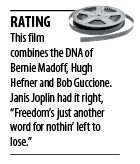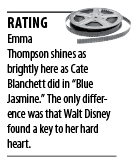Subscriber Benefit
As a subscriber you can listen to articles at work, in the car, or while you work out. Subscribe Now
 The Wolf of Wall Street
The Wolf of Wall Street
The only way to accurately describe Martin Scorsese’s “The Wolf of Wall Street” is to refer to a comment made by an elderly woman (older than me!) sitting in my row in the theater. As the movie ended and I stood to leave, she looked up at me, smiled and said, “Nothing like seeing a soft porn movie on a Sunday!” To which I responded, laughingly, “It wasn’t soft, madam!”
Bawdy and lascivious, the film literally is consumed with drugs, sex but no rock and roll. Scorsese has made a stylish skin flick passing as an alleged sensational film.
Though there are a few superior performances in the film, aside from an FBI agent (played spot on by Kyle Chandler), there isn’t a character that you will remotely admire, much less like. Taking place in the early 1990s, it describes a large group of young Wall Street fringe players who freely violate the law in the interest of satisfying both pleasure and passion.
Any review has to start with the magnificent performance by Leonardo DiCaprio, playing the amoral, hateful Jordan Belfort. Based on a book written by this wretched soul, DiCaprio’s Belfort enters Wall Street with lofty ideals and a great marriage, both of which soon disappear. It is hard to name a better actor than DiCaprio, who follows up memorable performances in 2012’s “Django Unchained” and last year’s “The Great Gatsby.” Unfortunately, his role here as Belfort resembles the plantation owner he embraced in “Django,” the difference being that his employees on Wall Street replace the roles of slaves.
Ironically, one of the best scenes in the film is at the beginning involving Matthew McConaughey. In a cameo appearance, McConaughey’s Mark Hanna sets DiCaprio’s character on his destructive path as he describes the purpose of a Wall Street trader as nothing more than putting money in his own pocket. McConaughey also describes the importance of the daily use of vodka, cocaine and masturbation, which pretty much encompasses the rest of the film.
 Jonah Hill is an uninspired waste of time playing DiCaprio’s assistant, doing little more than joining his boss with the use of a large amount of drugs, principally Quaaludes. He also loves the company of prostitutes, a hobby that dominates their lives.
Jonah Hill is an uninspired waste of time playing DiCaprio’s assistant, doing little more than joining his boss with the use of a large amount of drugs, principally Quaaludes. He also loves the company of prostitutes, a hobby that dominates their lives.
To be quite frank, the only other roles that hold your attention are played by Margot Robbie, Kyle Chandler and Rob Reiner. Robbie is startlingly attractive, playing Belfort’s sultry and seductive second wife. Reiner appears as Max Belfort, Belfort’s anguished, supportive father. The “Meathead” is memorable.
In the end, as you watched Belfort and his second marriage disintegrate in a manic haze fueled by a love of Quaaludes, only one thing could have saved the film. More to the point, you desperately wanted to hear Eric Burton and The Animals singing their classic hit,
“We gotta get out of this place,
If it’s the last thing we ever do.
We gotta get out of this place.
Girl, there’s a better life
For me and you.” (1965)
Saving Mr. Banks
“Saving Mr. Banks” is a justified tribute to the legendary genius Walt Disney. Yet, while Tom Hanks does an expected wonderful job playing Disney, the warmth of the film flows from its dark side.
First and foremost, you need to be warned that this is not a family movie, much less a film for small children. If that seems a bit ironic, think of what Walt Disney did with his earliest films.
“Snow White and the Seven Dwarfs” (1937) is downright scary. “Bambi” leaves you bawling your eyes out when the little deer learns of his mother being shot to death by hunters. “Dumbo” (1941) is again heartwarming, but you are left nearly apoplectic as his trunk interacts with his mother’s as they are confined in separate cages. Finally, the trauma felt by the young boy in “Old Yeller” (1957), a kid forced to watch his father kill a beloved dog who became rabid after saving his life, is etched on my soul.
 Though “Saving Mr. Banks” is not an Oscar winner, it will likely have the same emotional impact. Just imagine when you rode Disney World’s Space Mountain for the first time.
Though “Saving Mr. Banks” is not an Oscar winner, it will likely have the same emotional impact. Just imagine when you rode Disney World’s Space Mountain for the first time.
As most of you know, the plot centers on Disney’s decade-long quest to have P.L. Travers, the author of Mary Poppins, consent to having her beloved book made into a Disney movie. Playing Mrs. Travers, and she does want to be called Mrs. Travers, Emma Thompson captures the entire movie from the first moment she appears on screen. Living in London and hating the thought of losing control of her book, she is both arrogant and dismissive, lacking anything that resembles a warm heart.
Nonetheless, she is also nearly broke and finally submits to flying to Los Angeles to at least talk to Disney and his staff. What follows is a wonderful story about her smug interaction with the film’s screenwriter and music arrangers. Let me just say that the exasperation felt by all was quite amusing.
As expected, “Saving Mr. Banks” is filled with some meaningful performances. Paul Giamatti shines as Ralph, Travers’ Disney chauffeur, and he becomes her only American friend. Jason Schwartzman and B.J. Novak are a hoot as the songwriting brothers, Richard and Robert Sherman. Travers wanted no music of any kind in the film, and watch them hide the lyrics for “Supercalifragilisticexpialidocious.”’
However, the backbone of the film is found when Travers repeatedly reflects on her life as a small child in Australia. Colin Farrell is pitch perfect as her father, Travers Goff, a wonderful father who was wrestling with an alcohol problem that was slowly killing him. Wounded as a child, Travers remains wounded as an adult.
In the end, Hanks’ Walt Disney finally learns what the audience discovers, namely the hidden reason for Mary Poppins descending with her umbrella in the first place. If you are searching for the meaning behind the title of this film, then take some tissue. You will need it.•
__________
Robert Hammerle practices criminal law in Indianapolis. When he is not in the courtroom or working diligently in his Pennsylvania Street office, Bob can likely be found at one of his favorite movie theaters watching and preparing to review the latest films. To read more of his reviews, visit www.bigmouthbobs.com. The opinions expressed are those of the author.
Please enable JavaScript to view this content.
